一般疑问句改法及练习题
变一般疑问句、否定句、划线部分及同义句专项习题(八下)
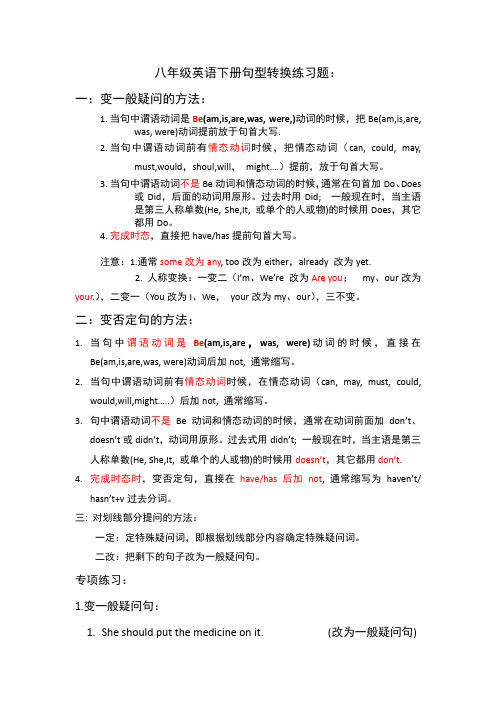
八年级英语下册句型转换练习题:一:变一般疑问的方法:1.当句中谓语动词是Be(am,is,are,was, were,)动词的时候,把Be(am,is,are,was, were)动词提前放于句首大写.2.当句中谓语动词前有情态动词时候,把情态动词(can, could, may,must,would,shoul,will,might….)提前,放于句首大写。
3.当句中谓语动词不是Be动词和情态动词的时候,通常在句首加Do、Does或Did,后面的动词用原形。
过去时用Did; 一般现在时,当主语是第三人称单数(He, She,It, 或单个的人或物)的时候用Does,其它都用Do。
4.完成时态,直接把have/has提前句首大写。
注意:1.通常some改为any, too改为either,already 改为yet.2. 人称变换:一变二(I’m、We’re 改为Are you;my、our改为your.),二变一(You改为I、We,your改为my、our),三不变。
二:变否定句的方法:1.当句中谓语动词是Be(am,is,are,was, were)动词的时候,直接在Be(am,is,are,was, were)动词后加not, 通常缩写。
2.当句中谓语动词前有情态动词时候,在情态动词(can, may, must, could,would,will,might…..)后加not, 通常缩写。
3.句中谓语动词不是Be动词和情态动词的时候,通常在动词前面加don’t、doesn’t或didn’t,动词用原形。
过去式用didn’t; 一般现在时,当主语是第三人称单数(He, She,It, 或单个的人或物)的时候用doesn’t,其它都用don’t. 4.完成时态时,变否定句,直接在have/has后加not, 通常缩写为haven’t/hasn’t+v过去分词。
三: 对划线部分提问的方法:一定:定特殊疑问词,即根据划线部分内容确定特殊疑问词。
一般疑问句的改写方法
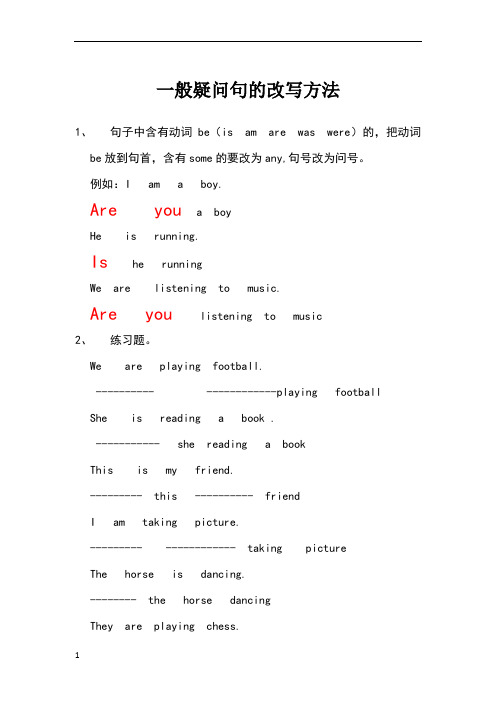
一般疑问句的改写方法1、句子中含有动词be(is am are was were)的,把动词be放到句首,含有some的要改为any,句号改为问号。
例如:I am a boy.Are you a boyHe is running.Is he runningWe are listening to music.Are you listening to music2、练习题。
We are playing football.---------- ------------playing footballShe is reading a book .----------- she reading a bookThis is my friend.--------- this ---------- friendI am taking picture.--------- ------------ taking pictureThe horse is dancing.-------- the horse dancingThey are playing chess.--------- -------- playing chessMy mother is making noodles.------- --------- mother making noodles3、句子中含有情态动词can will 的,把情态动词can或will放到句首,some改为any,句号改为问号。
例如:He can run fast.Can he run fastWe will go to the park tomorrow.Will you go to the park tomorrow4、练习题。
She can jump high.--------- she jump highSam can ride fast.---------Sam ride fastThey will play football tomorrow.--------- they play football tomorrowWe can swim in the sea.---------- ---------- swim in the sea5、句子中没有动词be,也没有情态动词can和will的,见到动词原形,就在句首加上Do,见到动词三单式,就在句首加上Does,见到动词的过去式,就在句首加上Did,助动词后面要用动词的原形,some要改成any,句号改为问号。
零基础语法练习:一般疑问句2(附超详细解析)

疑问句练习:四类疑问句之一般疑问句(附超详细解析)一、把下列句子改为一般疑问句,并作简略回答。
1.Bob is reading a book.2.He works in the factory.3.Helen often does her housework after office.4.There are five people in my family.5.Grandfather likes to read newspapers in the evening.6.She has lunch at school.7.Miss Li is my English teacher.8.The students are playing the guitar now.9.Li Ping’s brother is a bus driver.10.We are going to the cinema.11.I like dogs.12.I’d like some bread.13.Peter helps Lucy get the cat down.14.This is Ann’s bedroom.15.An tiger lives in the forest.16.Kitty is wearing her new uniform.17.The boy under the tree is hungry.18.He goes to school every day.19.I want to have a model car.20.She wants a cup of coffee.二、用do, does, be填空。
1. _____ she know all the answers ?Yes, she ____. No, she _____.2. _____ the twins often fight ?Yes, _____ do. No, _____ don’t.3. _____ your dad like listening to music? Yes, ____ does. No, _____ doesn’t.4. _____ uncle Tom wash his car everyday? Yes, ____ does. No, ____ doesn’t.5. _____ you have a new teacher?Yes, I ______. No, I ______.6. _____ she a teacher?Yes, she _____. No, she _____.7. ______ you playing ball now?Yes, I ______. No, I ______.8. ______ the pig like to sleep?Yes, it ______. No, it _____.9. _____ your father smoking in the living room? Yes, ____ is. No, he _____.10.____she buy a book yesterday?Yes, she ____. No, she ____.三、答案及解析第一题解析:1.Bob is reading a book.答案:Is Bob reading a book?Yes, he is.No, he isn’t.解析:一般疑问句的改法,当陈述句中有be..动词...时,可直接将../情态动词..../助动词它们提至句首,句末加“?”。
一般疑问句改法及练习题
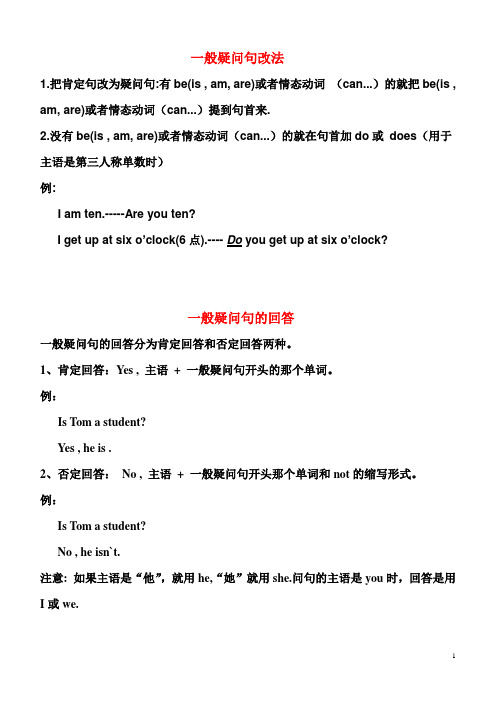
一般疑问句改法1.把肯定句改为疑问句:有be(is , am, are)或者情态动词(can...)的就把be(is , am, are)或者情态动词(can...)提到句首来.2.没有be(is , am, are)或者情态动词(can...)的就在句首加do或does(用于主语是第三人称单数时)例:I am ten.-----Are you ten?I get up at six o’clock(6点).---- Do you get up at six o’clock?一般疑问句的回答一般疑问句的回答分为肯定回答和否定回答两种。
1、肯定回答:Yes , 主语+ 一般疑问句开头的那个单词。
例:Is Tom a student?Yes , he is .2、否定回答:No , 主语+ 一般疑问句开头那个单词和not的缩写形式。
例:Is Tom a student?No , he isn`t.注意: 如果主语是“他”,就用he,“她”就用she.问句的主语是you时,回答是用I或we.否定句改法1.有be(is , am, are)或者情态动词(can...)的就在be或者情态动词(can...)后面+not2.没有Be的就在主语的后面+do not或does not(用于主语是第三人称单数时)例:I am a teacher. ----I am not a teacher.She likes singing.------She does not like singing.如何区分英语中的人称英语中的人称可以分为:第一人称、第二人称、第三人称。
第一人称指的是:我(I)我们(we)第二人称指的是:你(you)你们(you)第三人称指的是:他(he)、她(she)、它(it),(他、她、它)们(they),或者名字,比如:Amy。
或者XX的妈妈、XX的......注意:如果指的是一个人,或者指一个物品都属于第三人称单数。
一般疑问句及综合练习
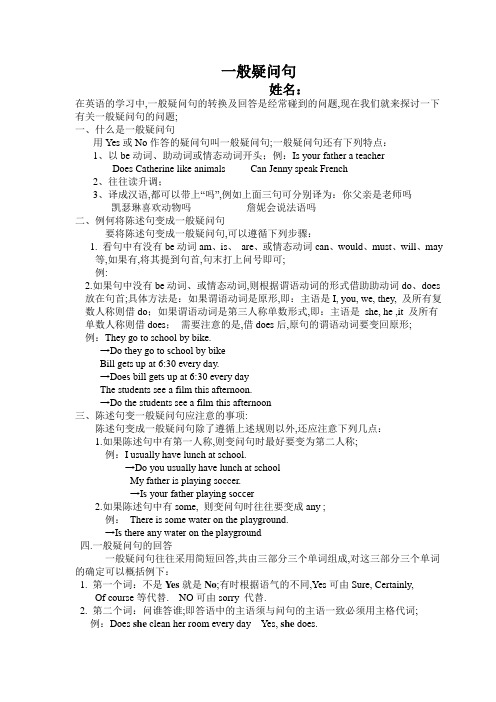
一般疑问句姓名:在英语的学习中,一般疑问句的转换及回答是经常碰到的问题,现在我们就来探讨一下有关一般疑问句的问题;一、什么是一般疑问句用Yes或No作答的疑问句叫一般疑问句;一般疑问句还有下列特点:1、以be动词、助动词或情态动词开头;例:Is your father a teacherDoes Catherine like animals Can Jenny speak French2、往往读升调;3、译成汉语,都可以带上“吗”,例如上面三句可分别译为:你父亲是老师吗凯瑟琳喜欢动物吗詹妮会说法语吗二、例何将陈述句变成一般疑问句要将陈述句变成一般疑问句,可以遵循下列步骤:1. 看句中有没有be动词am、is、are、或情态动词can、would、must、will、may等,如果有,将其提到句首,句末打上问号即可;例:2.如果句中没有be动词、或情态动词,则根据谓语动词的形式借助助动词do、does 放在句首;具体方法是:如果谓语动词是原形,即:主语是I, you, we, they, 及所有复数人称则借do;如果谓语动词是第三人称单数形式,即:主语是she, he ,it 及所有单数人称则借does;需要注意的是,借does后,原句的谓语动词要变回原形;例:They go to school by bike.→Do they go to school by bikeBill gets up at 6:30 every day.→Does bill gets up at 6:30 every dayThe students see a film this afternoon.→Do the students see a film this afternoon三、陈述句变一般疑问句应注意的事项:陈述句变成一般疑问句除了遵循上述规则以外,还应注意下列几点:1.如果陈述句中有第一人称,则变问句时最好要变为第二人称;例:I usually have lunch at school.→Do you usually have lunch at schoolMy father is playing soccer.→Is your father playing soccer2.如果陈述句中有some, 则变问句时往往要变成any ;例:There is some water on the playground.→Is there any water on the playground四.一般疑问句的回答一般疑问句往往采用简短回答,共由三部分三个单词组成,对这三部分三个单词的确定可以概括例下:1. 第一个词:不是Yes就是No;有时根据语气的不同,Yes可由Sure, Certainly,Of course等代替. NO可由sorry 代替.2. 第二个词:问谁答谁;即答语中的主语须与问句的主语一致必须用主格代词;例:Does she clean her room every day Yes, she does.Is Anna′s father a doctor No,he isn′t.如果主语是this, that, 回答时用it 代替,如果问句中主语these, those,回答时用they 代替;3. 第三个词:用什么词问,用什么词答;即沿用问句中的引导词;如:Can Jim play soccer Yes, he can.Does Mr Bean speak English Yes, he does.4.用No开头作否定回答时,结尾要加上not;因为回答必须是三部分,所以否定回答必须缩写,而肯定回答不能缩写;如:Does Tom come here every day Yes, he does. No , he doesn’t.Is Lin Lin in Class 3 Yes, she is. No, she isn′t.或No, she′s not.练习二、用适当的词适当形式填空;1. He_________likecollecting stamps.2. My pen pal__________watchTV at night.3. Mike__________ goto work by bus.4. I like__________ makekites.5. Mr. Bill________ teachEnglish1. Let’s _______ take them to your bedroom.2. What’s Tom doing He swim in a river.3. He’s very strong. So he can ________ carry the big box.4. Does she _________ have a good time5. I like _________ play basketball. He _________ like watching TV.6. You can’t _________ put your mobile phone beside the computer.7. There are three ________ tomato in the basket.8. How many _______ sheep are there on the farm9. There _____ be some milk and eggs on the table.10. John can ______ dance. Look He _______dance now.11. My mother is visit my grandparents next weekend.She______ buy some presents for them every week.12. ______ your friend ________ play the piano every day三、按要求进行句型转换:1. I like drawing pictures.对划线部分提问_________________________________________________Jie likes playing the violin. 对划线部分提问_________________________________________________likes listening to music.变成一般疑问句,并做出否定回答_________________________________________________likes collecting stamps.变成否定句_________________________________________________father doesn’t like watching TV.变成肯定句_________________________________________________6. Is there a cinema near here做否定回答7. The cinema is west of the school.对画线部分提问8. How can I get to the museum 根据提示做回答,Then .直走五分钟,然后向右拐9. Are you going to the bookstore on foot 做肯定和否定回答10. I’m at the cinema now.对画线部分提问11. Wash the clothes.改为否定句12. She is catching insects now.用“every day”改为一般现在时.13. Ann and Lily watch TV in the evening.改为一般将来时14. He is going to visit his grandparents tomorrow morning对划线部分提问15. My father is going to Shanghai tomorrow. 对划线部分提问16. Sarah likes listening to music. 变成一般疑问句,并做出否定回答17. I’m going to the plant shop.用where提问18. Sarah is going to buy a magazine. 用what提问19. Amy is going to the bookstore this weekend.用when提问20. Zheng Peng are going buy bus. 改错句21. How do you go to the park 根据你的实际情况回答22. I have many books. 改为否定句23. Alice’s sister likes playing table tennis 改为一般疑问句24. She lives in a small town near New York. 改为一般疑问句25. I watch TV every day. 改为一般疑问句26. David has some stamps. 改为一般疑问句27. We have four lessons.否定句28. Nancy doesn’t run fast 肯定句。
一般疑问句及综合练习
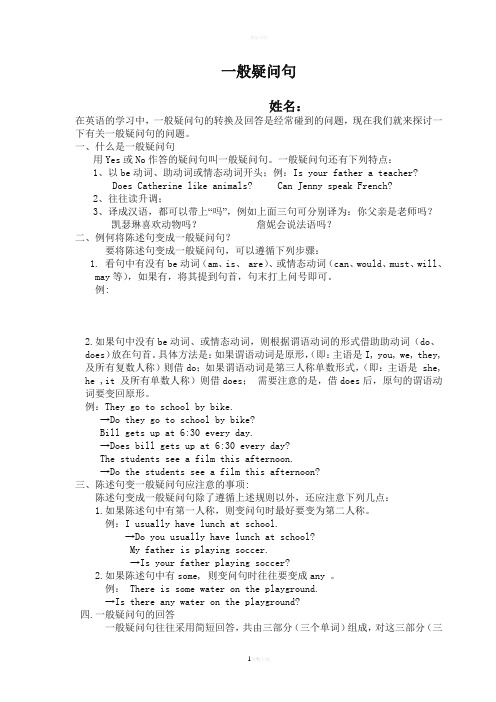
一般疑问句姓名:在英语的学习中,一般疑问句的转换及回答是经常碰到的问题,现在我们就来探讨一下有关一般疑问句的问题。
一、什么是一般疑问句用Yes或No作答的疑问句叫一般疑问句。
一般疑问句还有下列特点:1、以be动词、助动词或情态动词开头;例:Is your father a teacher?Does Catherine like animals? Can Jenny speak French?2、往往读升调;3、译成汉语,都可以带上“吗”,例如上面三句可分别译为:你父亲是老师吗?凯瑟琳喜欢动物吗?詹妮会说法语吗?二、例何将陈述句变成一般疑问句?要将陈述句变成一般疑问句,可以遵循下列步骤:1. 看句中有没有be动词(am、is、 are)、或情态动词(can、would、must、will、may等),如果有,将其提到句首,句末打上问号即可。
例:2.如果句中没有be动词、或情态动词,则根据谓语动词的形式借助助动词(do、does)放在句首。
具体方法是:如果谓语动词是原形,(即:主语是I, you, we, they, 及所有复数人称)则借do;如果谓语动词是第三人称单数形式,(即:主语是 she, he ,it 及所有单数人称)则借does;需要注意的是,借does后,原句的谓语动词要变回原形。
例:They go to school by bike.→Do they go to school by bike?Bill gets up at 6:30 every day.→Does bill gets up at 6:30 every day?The students see a film this afternoon.→Do the students see a film this afternoon?三、陈述句变一般疑问句应注意的事项:陈述句变成一般疑问句除了遵循上述规则以外,还应注意下列几点:1.如果陈述句中有第一人称,则变问句时最好要变为第二人称。
改一般疑问句的方法与练习

改一般疑问句的方法与练习有3种类型:类型一、当句子有be动词(am,is,are,was,were)(其中任一个,注意:am、is的过去式是was;are的过去式是were),把be动词提到句首,并大写,第一人称↔第二人称,some变any,and变or。
(第一人称↔第二人称:I →you ,we →you ,my →your ,I am=I’m→Are you,I was →Were you)例:①I’m hungry . →Are you hungry?肯定回答:Yes,I am. 否定回答:No ,I’m not.②The boy is strong . →Is the boy strong?肯定回答:Yes,he is. 否定回答:No,he isn’t.类型二、当句子有情态动词(can,will)其中任一个,把情态动词提到句首,并大写,第一人称↔第二人称,some 变any,and 变or。
注意:情态动词后面的动词要用原形。
例:①、I can swim . →Can you swim ?肯定回答:Yes,I can. 否定回答:No ,I can’t.②、My mother will make dumplings . →Will your mother make dumplings?肯定回答:Yes,she is. 否定回答:No ,she won’t.类型三、当句子没有be动词也没有情态动词,即无be无情时,变一般疑问句要借助助动词肯定形式(do、does、did)注意:助动词后面的动词要用原形。
⑴、当主语是第一人称、第二人称或复数(I、we、you、they、名词复数),而且主语后面的动词是原形,那就要借助Do变成一般疑问句。
例:①、I go to the park. →Do you go to the park ?肯定回答:Yes,I do . 否定回答:No ,I don’t .②、These girls like listening to music. →Do these girls like listening to music?肯定回答:Yes,they do. 否定回答:No,they don’t.⑵、当主语是第三人称(he、she 、it、单数、人名、称呼、地名),而且主语后面的动词是第三人称单数形式(即动词词尾一般加s或加es),就要借助Does变成一般疑问句。
一般疑问句改写练习(助动词)

一般疑问句改写练习(助动词)一、改写规则肯定句改为一般疑问句,没有be动词也没有情态动词的,引入助动词(do、does、did)放句首,其后动词用原型;第一人称变第二人称;some变any。
本篇重点讲解含有实义动词的情况,下面通过几个例子来了解下。
二、举例分析1. I play basketball very well.(改为一般疑问句)分析:题中没有be动词也没有情态动词,有实义动词(play),故引入助动词do或does,由于I是第一人称,只有当主语是第三人称单数的时候采用does,所以用助动词do;第一人称(I)变第二人称(you),直接改为:Do you play basketball very well?2.My father likes going swimming.(改为一般疑问句)分析:题中没有be动词也没有情态动词,有实义动词(like),故引入助动词do或does,由于my father是第三人称单数,所以用助动词does;第一人称(my)变成第二人称(your),紧随其后的动词用原形(likes-like),故改为:Does your father like going swimming?3.Tom had some milk yesterday morning.(改为一般疑问句)分析:题中没有be动词也没有情态动词,有实义动词had (have过去式),是一般过去时态,故引入助动词did; some 变any,故改为:Did Tom have any milk yesterday morning?三、巩固练习1.We often talk about our hobbies.(改为一般疑问句)2.I like running and jumping.(改为一般疑问句)3.She comes back home at 6 pm .(改为一般疑问句)4.Daniel has lots of homework.(改为一般疑问句)5.Lily and I go to school on foot.(改为一般疑问句)6.We all have a good time today.(改为一般疑问句)7.His teacher always reads stories in class.(改为一般疑问句)8.I went to Nanjing with my brother last week.(改为一般疑问句)9.He always reads books before bedtime.(改为一般疑问句)10.My uncle teaches English in our school.(改为一般疑问句)11.Lily went to hospital to look after her grandfather last Sunday.(改为一般疑问句)12.Tim’s brother seldom goes shopping with us.(改为一般疑问句)13.The little dog lost its way.(改为一般疑问句)14.We bought some gifts for our teachers. (改为一般疑问句)15.They love going swimming very much.(改为一般疑问句)16.His mum often brings nice sweets for us.(改为一般疑问句)17.The kite flies high in the sky.(改为一般疑问句)18.All of us saw that strange man in our school.(改为一般疑问句)19.Bob and I got the same points.(改为一般疑问句)20.I usually have breakfast at 7o’clock in the morning.(改为一般疑问句)21.She does her homework carefully.(改为一般疑问句)。
- 1、下载文档前请自行甄别文档内容的完整性,平台不提供额外的编辑、内容补充、找答案等附加服务。
- 2、"仅部分预览"的文档,不可在线预览部分如存在完整性等问题,可反馈申请退款(可完整预览的文档不适用该条件!)。
- 3、如文档侵犯您的权益,请联系客服反馈,我们会尽快为您处理(人工客服工作时间:9:00-18:30)。
宋楼完小一般疑问句改法
1•把肯定句改为疑问句就是有be(is , am, are)或者情态动词(can...)的就把be
(is ,
am, are)或者情态动词(can...)提到句首来.
2•没有be(is , am, are)或者情态动词(can…)的就在句首加do或does (用于主语是第三人称单数时)
例:l am you ten
I get up at six o'lock(6 点).——Do you get up at six o'clock
一般疑问句的回答
一般疑问句的回答分为肯定回答和否定回答两种。
1、肯定回答:
Yes ,主语+ 一般疑问句开头的那个单词。
例如:
Is Tom a stude nt
Yes , he is .
2、否定回答:
No ,主语+ 一般疑问句开头那个单词和 not的缩写形式。
例如:
Is Tom a stude nt
No , he isn、t.
注意:如果主语是男性,就用he,女性就用she.问句的主语是you时,回答是用I或we.
否定句改法:
1•有be(is , am, are)或者情态动词(can...)的就be或者情态动词(can…)后面+not 2•没有Be的就在主语的后面+do not或does not (用于主语是第三人称单数时)
例:I am a teacher. ----1 am not a teacher.
She likes does not like singing.
如何区分英语中的人称
英语中的人称可以分为:第一人称、第二人称、第三人称。
第一人称指的是:我(I)我们(we)
第二人称指的是:你(you)你们(you)
第三人称指的是:他(he)、她(she)、它(it),(他、她、它)们(they),或者名字,比如:Amy。
或者XX的妈妈、XX的……
注意:如果指的是一个人,或者指一个物品都属于第三人称单数。
Be动词用法:
我(I)用am,你(you)用are, is用于他(she)他(he)它(it)。
单数名词用is,复数名词都用are。
宋楼完小五年级英语一般疑问句练习题
一、将下列句子改成一般疑问句:并做肯定回答和否定回答
1.It is a dog. ______________ _______________ _________________________
Yes, ___________ No, _______________
2.She is a cute ________ ________________
Yes, ___________ No, _______________
3.He is my _____________________________________
Yes, ___________ No, _______________
4.They are Amy' s isters. _______________________________________________
Yes, ___________ No, _______________
5.We are classmates同学). ____________________________________________
Yes, ___________ No, _______________
6.I am a stude nt. ____________________________________________________
Yes, ___________ No, _______________
7.There is a bird in the tree(树). ____ ________ _____________________
Yes, ___________ No, _______________
8.There are many stars(星星)in the sky (天空). _______________________
Yes, ___________ No, _______________
9.They are good frie nds. ________________________________________________
Yes, ___________ No, _______________
10.She loves her gran dpa. _____________________________________________
Yes, ___________ No, _______________
11.I play computer games (游戏)____________________________________ e very night. Yes, ___________ No, _______________
12.There are many books on the desk. _____________________________________
Yes, ___________ No, _______________
13.We like to play football. _____________________________ _______________
Yes, ___________ No, _______________
14.We go to school in the morni ng. ______________________________________
Yes, ___________ No, _______________
15.It is a beautiful park(公园). ___________________ ______________ ___
Yes, ___________ No, _______________
16.It is a big map. _______________________ ___________________________
Yes, ___________ No, _______________。
